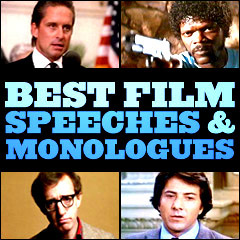|
Best Film Speeches and Monologues
|
|
Title Screen
|
Film Title/Year and Description of Film Speech/Monologue |
Screenshots
|
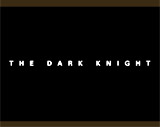
|
The Dark Knight (2008)
Screenwriter(s): Jonathan Nolan, Christopher Nolan
 "You
Wanna Know How I Got 'Em [Scars]?" - "Now I'm Always Smiling" "You
Wanna Know How I Got 'Em [Scars]?" - "Now I'm Always Smiling"
Play clip (excerpt):  (with
Gambol) (with
Gambol)
Play clip (excerpt):
 (with
Rachel) (with
Rachel)

A few times in the film, the grotesque Joker
(Heath Ledger) recited similar but conflicting origin stories
about his hideous facial scars. In the first major instance, the
Joker cleverly infiltrated into the gang of African-American
Gambol (Michael Jai White) in a pool hall. He threateningly
told the boss about the origin of his scars (and his
perpetual smile), and then killed Gambol - and took over his
operation:
Want to know how I got these scars? My father
was a drinker and a fiend. And one night, he goes off crazier
than usual. Mommy gets the kitchen knife to defend herself.
He doesn't like that. Not one bit. So, me watching, he takes
the knife to her, laughing while he does it. He turns to
me, and he says: 'Why so serious?' He comes at me with the
knife - 'Why so serious?!' He sticks the blade in my mouth.
'Let's put a smile on that face!' And why so serious?
Later, the Joker also repeated
a similar, intimidating rant to beautiful Rachel Dawes (Maggie
Gyllenhaal) - "Harvey's
squeeze" -
while brandishing a knife at her
as the camera circled around them disorientingly:
Well, you look nervous. Is it the scars? You
wanna know how I got 'em? Come here. Hey! Look at me. So I
had a wife, beautiful, like you, who tells me I worry too much.
Who tells me I oughta smile more. Who gambles and gets in deep
with the sharks... Look at me! One day, they carve her face.
And we have no money for surgeries. She can't take it. I just
want to see her smile again, hmm? I just want her to know that
I don't care about the scars. So, I stick a razor in my mouth
and do this to myself. And you know what? She can't stand
the sight of me! She leaves. Now I see the funny side. Now
I'm always smiling!
|


The Joker With Gambol
(Michael Jai White)




The Joker With Rachel (Maggie Gyllenhaal)
|

|
Doubt (2008)
Screenwriter(s): John Patrick Shanley
 "You
Accept What You Got To Accept and You Work With It" "You
Accept What You Got To Accept and You Work With It"
In the mid-1960s, strict Bronx Catholic School
Principal, Sister Aloysius Beauvier (Meryl Streep) expressed
her concern about Donald, a 12 year-old student -
the school's only black student, and one of the altar boys (who
was punished when caught drinking wine). She suspected that the
boy was also a victim of sexual abuse ("an improper relationship")
by Catholic Father Brendan Flynn (Philip Seymour Hoffman). She
spoke to Donald's mother Mrs. Miller (Viola Davis) about her
suspicions, even questioning the mother's integrity ("What
kind of mother are you?") when
she appeared to accept what was happening.
Mrs. Miller stated
to shocked Sister Beauvier that the matter shouldn't be pursued
any further, and that Donald just had to make it to the end of
the school year before entering high school. She also hinted
that Donald was homosexual, and that his father had beaten him
because of his "nature" - but that Father Flynn was a good and
kind influence on her son:
Excuse me, but you don't know enough about life
to say a thing like that, Sister...You know the rules maybe,
but that don't cover it...You accept what you got to accept
and you work with it....Well, he's got to be somewhere,
maybe he's
doin' some good, too...Well, maybe some of them boys
want to get caught. That's why his father beat
him. Not the wine...I'm talkin' about the
boy's
nature now. Not anything he's done. You can't hold
a child responsible for what God gave him to be...But
then there's the boy's nature...Forget it
then. You're gonna force the people to say things. My boy came
to your school 'cause
they were gonna kill him in the public school. His father don't
like him. He come to your school, kids don't like him.
One man is good to him, this priest. And does
a man have his reasons? Yes. Everybody does. You have your
reasons but, do I ask the man why he's good to my son? No.
I don't care why. My son needs some man to care about him.
And to see him through the way he wants to go. And thank God
this educated man, with some kindness in him, wants to do just
that.
|



|
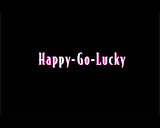
|
Happy-Go-Lucky
(2008)
Screenwriter(s): Mike Leigh
 Accusations
of Seduction Accusations
of Seduction
Annoyed, bitter, and misogynistic Axle School of
Motoring driving instructor Scott (Eddie Marsan) was jealously
angered by his driving pupil, English primary
schoolteacher Pauline "Poppy" Cross (Sally Hawkins) -
an optimistic free spirit. In a rambling dialogue of dislike, he
revealed his own feelings for her while raging at her for seducing
him:
Yes, you are patronizing me. You're always
patronizing me. This is what you always wanted, this is what
you set out to achieve, this is the game you played. You prodded
me, you poked me, you stroked me, you teased me, you flirted
with me, you sucked me in. You wore your high heeled boots
and your short skirt and your low-cut top, and you flashed
your tits, you tossed your hair, you played with the gearstick.
You lied to me!
This is all about you. The world has to revolve
around you. I'm a driving instructor.
I just wanted to do my job, you had no intention of learning
how to drive. You got in that car with one thing in mind: to
reel me in. And why? Because you have to be adored, you've
got to be wanted. And you drink it in, and you leave me with
a spring in your step and you go off and you f--k your boyfriend
and you f--k your girlfriend and you all drive around in that
stupid little yellow car!
|


|

|
Milk (2008)
Screenwriter(s): Dustin Lance Black
 "My Name is Harvey Milk and I'm Here to Recruit You" "My Name is Harvey Milk and I'm Here to Recruit You"
Gay activist and San Francisco's City Supervisor
and community organizer Harvey Milk (Oscar-winning Best Actor
Sean Penn) delivered two speeches in his war against Proposition
6 (aka The Briggs Initiative) on the ballot in California that
proposed to fire and bar gay teachers from jobs in California's
public schools.
The first speech was at the Gay Freedom Day Parade
in SF in late June 1978:
My name is Harvey Milk and I'm here to recruit
you. I want to recruit you for the fight to preserve your democracy.
Brothers and sisters, you must come out! Come out to your parents,
come out to your friends, if indeed they are your friends.
Come out to your neighbors, come out to your fellow workers.
Once and for all, let's break down the myths and destroy the
lies and distortions. For your sake, for their sake. For the
sake of all the youngsters who have been scared by the votes
from Dade to Eugene.
On the Statue of Liberty it says, 'Give
me your tired, your poor, your huddled masses yearning to be
free.' In the Declaration of Independence, it is written,
'All men are created equal and endowed with certain inalienable
rights.'
So for Mr. Briggs and Mrs. Bryant, and all
the bigots out there, no matter how hard you try, you can
never erase those words from the Declaration of Independence!
No matter how hard you try, you can never chip those words
from the base of the Statue of Liberty! That is where America
is! Love it or leave it!
|



|

|
Milk (2008)
Screenwriter(s): Dustin Lance Black
 "A Message of Hope" "A Message of Hope"
The second speech in the biopic was pioneering
gay politician Harvey Milk's victory speech after the defeat
of Proposition 6 in California in 1978, on the eve of his own
assassination:
Tonight, it's become clear to everyone
out there that they do know one of us, and now that they do,
they can see that we are not sick. They can feel that we are
not wrong. And they know that there must be, that there should
be a place for us in this great country, in this world. A message
of hope has been sent to all those young people, to all of
those who have been afraid by this wave of hate, to all of
those who have lost their homes, lost their hometowns. Tonight,
we are clear that there is a place for us! My brothers and
sisters, we can come home again.
|

|

|
Nothing But the Truth (2008)
Screenwriter: Rod Lurie
 "We'll
Make the First Amendment Irrelevant" "We'll
Make the First Amendment Irrelevant"
In writer/director Rod Lurie's intelligent and
suspenseful political thriller, very loosely inspired by
the so-called 2005 Valerie Plame affair, high-priced and fashion-conscious
Washington lawyer Albert Burnside (Alan Alda) defended
Capital Sun-Times news reporter Rachel Armstrong (Kate
Beckinsale) before a Supreme Court hearing, for her right to
withhold the identity of her "original source":
In 1972 in Branzburg v. Hayes, this
court ruled against the right of reporters to withhold the
names of their sources before a grand jury, and it gave the
power to the government to imprison those reporters who did.
It was a 5-4 decision. Close. In his dissent in Branzburg,
Justice Stewart said, 'As the years pass, the power of government
becomes more and more pervasive. Those in power,' he said,
'whatever their politics, want only to perpetuate it, and
the people are the victims.' Well, the years have passed,
and that power is pervasive.
Mrs. Armstrong could have buckled to the demands
of the government. She could have abandoned her promise of
confidentiality. She could have simply gone home to her family.
But to do so would mean that no source would ever speak
to her again, and no source would ever speak to her newspaper
again, and then tomorrow when we lock up journalists from
other newspapers, we'll make those publications irrelevant
as well, and thus we'll make the First Amendment irrelevant.
And then how will we know if a President has
covered up crimes? Or if an army officer has condoned
torture? We,
as a nation, will no longer be able to hold those in power
accountable to those whom they have power over. And what
then is the nature of government when it has no fear of accountability?
We should shutter at the thought. Imprisoning journalists?
That's for other countries. That's for countries who fear
their citizens, not countries that cherish and protect them.
Some time ago,
I began to feel the personal human pressure on Rachel Armstrong,
and I told her that I was there to represent her and not
a principle. And it was not until I met her that I realized
that with great people, there's no difference between principle
and the person.
|

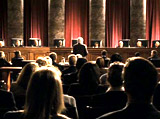

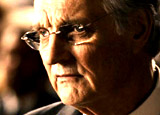
|

|
Synecdoche, New York (2008)
Screenwriter(s): Charlie Kaufman
 Funeral
Monologue - There Is Fate: "It's What You Create" and Everyone
is Miserable Funeral
Monologue - There Is Fate: "It's What You Create" and Everyone
is Miserable
The Minister (Mark Lotito) - an actor playing
a priest at a staged funeral, delivered a eulogy ending
with "Well, f--k everybody" - in which he described
how most human beings spend their time basically being miserable,
dead or not yet born:
Everything is more complicated than you think.
You only see a tenth of what is true. There are a million
little strings attached to every choice you make. You can
destroy your life every time you choose. But maybe you won't
know for twenty years. And you may never ever trace it to
its source. And you only get one chance to play it out. Just
try and figure out your own divorce. And they say there is
no fate, but there is. It's what you create. And even though
the world goes on for eons and eons, you are only here for
a fraction of a fraction of a second. Most of your time is
spent being dead or not yet born. But while alive, you wait
in vain, wasting years, for a phone call or a letter or a
look from someone or something to make it all right. And
it never comes or it seems to, but it doesn't really.
And
so you spend your time in vague regret or vaguer hope that
something good will come along. Something to make you feel
connected, something to make you feel whole, something to
make you feel loved. And the truth is, I feel so angry, and
the truth is, I feel so f--king sad, and the truth is, I've
felt so f--king hurt for so f--king long and for just as
long I've been pretending I'm OK, just to get along, just
for, I don't know why. Maybe because no one wants to hear
about my misery, because they have their own.
Well, f--k everybody. Amen.
|
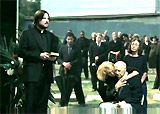


|

|
The Wrestler (2008)
Screenwriter(s): Robert D. Siegel
 "I
Deserve To Be All Alone - I Just Don't Want You To Hate Me" "I
Deserve To Be All Alone - I Just Don't Want You To Hate Me"
Aging pro wrestler Randy "The Ram" Robinson (Mickey
Rourke) spoke to his estranged daughter Stephanie (Evan Rachel
Wood), admitting his failure as a father when he abandoned her
as a child - but he kept on failing by missing their dinner appointment:
I just want to tell you, I'm the one who was
supposed to take care of everything. I'm the one who was supposed
to make everything okay for everybody. It just didn't work
out like that. And I left. I left you. You never did anything
wrong, you know. I used to try to forget about you. Ha, ha.
I used to try to pretend that you didn't exist - but I can't.
You're my girl. You're my little, you're my little girl. And
now, I'm an old broken down piece of meat and I'm alone.
And I deserve to be all alone. I just don't want you to hate
me. OK?
|


|

|
The Wrestler (2008)
Screenwriter(s): Robert D. Siegel
 "I'm Still Standing Here and I'm The Ram" "I'm Still Standing Here and I'm The Ram"
Play clip (excerpt): 
Aged, washed-up pro wrestler Randy "The
Ram" Robinson (Mickey Rourke) had retired from wrestling
due to a heart attack (and bypass surgery). But he returned to
the ring and just moments
before his 20th anniversary (and fatal) rematch with the Ayatollah
(Ernest Miller), he gave an emotional, uplifting speech to his
devoted wrestling fans:
I just wanna say to you all tonight,
I'm very grateful to be here. A lot of people told me that I'd
never wrestle again. And that's all I do. You know, if you live
hard and you play hard, and you burn the candle at both ends,
you pay the price for it. You know, in this life you can lose
everything that you love, everything that loves you. Now, I don't
hear as good as I used to, and I forget stuff, and I ain't as
pretty as I used to be. But god-damn it, I'm still standing here
and I'm The Ram. (Applause)
As time goes by, as time goes by,
they say: 'He's washed up. He's finished. He's a loser. He's
all through.' But you know what? The only ones who are gonna
tell me when I'm through doing my thing is you people here! (Applause)
You people here, you people here are the ones who are worth bringing
it for, because you're my family. I love all of you. Thank you
so much.
|


|
